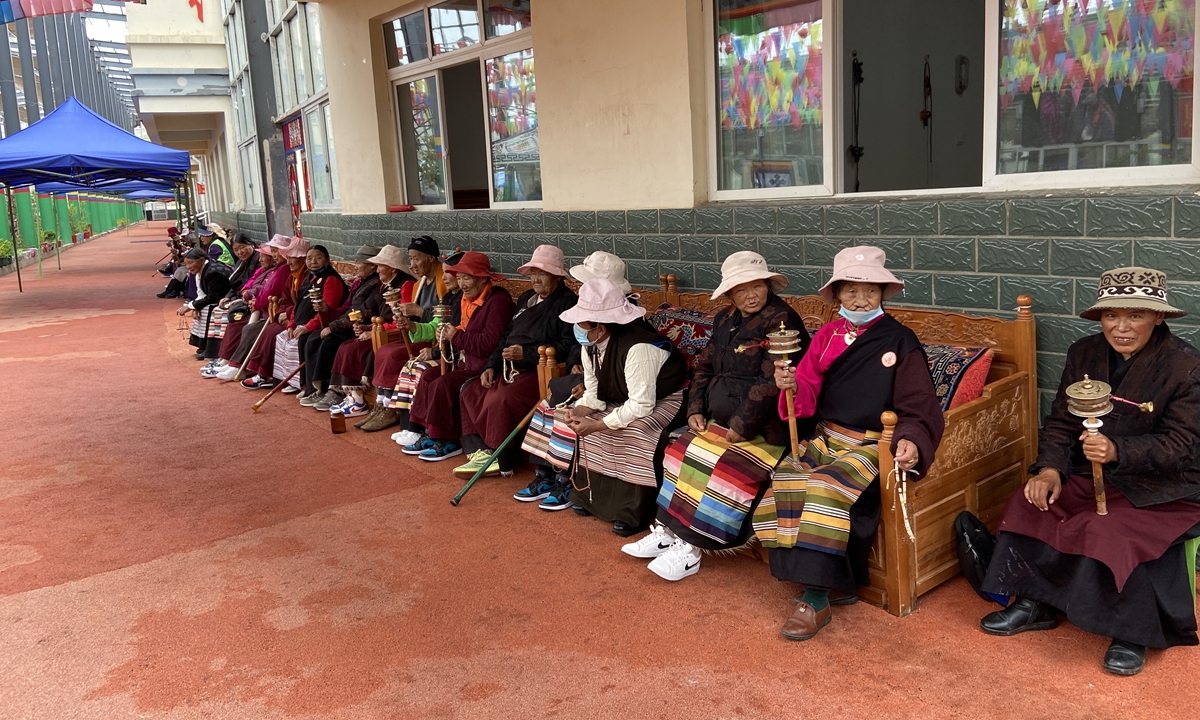Religious freedom protected at an elderly nursing home
By Xie Wenting Source: Global Times Published: 2020/8/4 16:13:40

Photo: Xie Wenting/GT
Spinning a handheld prayer wheel, elderly people piously practiced their religion at a nursing home in Dingqing county, Qamdo, Southwest China's Tibet Autonomous Region on Wednesday.
Dressed in traditional Tibetan clothing, they sat in two rows while quietly reciting prayers. While they cannot speak Putonghua (Standard Chinese), their kindness was clear when they greeted outsiders who arrived with amicable, welcoming gestures.
Different from most elderly nursing homes in other places, this one provides services free of charge. The home, 13,298 square meters in size, began operations in 2015. It cost a total investment of 58 million yuan ($8.3 million) to build.
One of the most unique installations in the nursing home are two large handheld prayer wheels and a hospice care room.
Unlike many hospice care rooms throughout the mainland, the Qamdo facility hosts the patients' body for three days after his or her death. During this time, monks are invited to the room to recite Tibetan Buddhist sutras.
After three days, the body is transported to another place for a celestial burial, a ritual in which the corpse is usually placed on the top of a mountain to be consumed by scavengers such as vultures.
Dawa Tsering, director of local civil affairs bureau, told the Global Times they set up the hospice care room in October 2015, aiming to soothe the concerns of the elderly people living here.
"Every year, there are people here passing away and it's their [funeral] tradition, so we need to respect it," he said.
After their deaths, the nursing home will normally contact the relatives of the deceased to pick up their loved ones for celestial burial. But if no relative comes, the nursery home will handle their funeral.
The elderly people living here can receive a subsidy of more than 10,000 yuan a year provided by the government. Not all the 187 people living at the nursing home are elderly people; some are the disabled.
Dawa Tsering said the two large handheld prayer wheels do not only have religious uses, but are also for fitness. Many of the elderly people at the home generally do not like to walk outside to keep fit but prefer to walk around by spinning the prayer wheels.
"Their religious needs and freedoms are protected here," he said.
According to him, despite all services being free of charge, people were still unwilling to come here in the beginning. The staff initially had to persuade the elderly in Qamdo to experience the nursing home for themselves.
There were only a dozen or so elderly people living here at the initial stage, but after seeing how the good environment and services changed their lives, more people applied to come.
The nursing home is well-equipped with a caring room, hair salon, bathing room and a little supermarket among many other accommodations.
The oldest resident living here is aged 93.
Kelsang Dechen, director of the nursing home, said this woman enjoys a "privileged" life here.
"If she wants to visit her old home, we will send a car to bring her. If she wants to see a living Buddha today, we will send a car to take her to the temple," Kelsang Dechen said.
While the 93-year-old cannot speak Putonghua, her brilliant smile could be seen from all the way across the room.